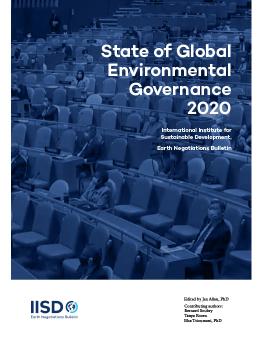
The State of Global Environmental Governance 2020
The COVID-19 pandemic brought devastation in 2020, including to plans to ramp up international cooperation on climate action, biodiversity restoration, reducing inequality, and a number of other crises.
-
Traditional multilateralism slows to a crawl when diplomats are unable to meet in person—whether in negotiating halls or informal corridor huddles.
-
Transparency is at a premium in the online world, where reliable Internet access and preferential time zones make it easier for some countries to meet in virtual spaces.
-
Some substantive decisions were made, though mostly by smaller bodies focused on implementation. Political will is vital if we are to build back better from the pandemic.
Our Earth Negotiations Bulletin team unpacks the rollercoaster year—from the heady optimism of early meetings to the suspension of face-to-face meetings in March followed by the urgent shift to online spaces to rebuild momentum. The report evaluates what works and what flops in the realm of "Zoomplomacy," early understandings of what impact the pandemic had on the global environment, and what we can hope for in 2021 as vaccination efforts unfurl across the planet.
Bringing their 28 years' expertise as trusted observers inside negotiating rooms, the Earth Negotiations Bulletin team offers a frank, concise look at how the international community struggled to address existing challenges while also accounting for one of the most destructive events of our age.
Participating experts
You might also be interested in
The State of Global Environmental Governance 2023
In global environmental talks in 2023, the focus across nearly all issue areas was funding implementation and reviewing performance.
December 2024 | Carbon Minefields Oil and Gas Exploration Monitor
In November 2024, 23 oil and gas exploration licences were awarded across five countries, with Russia granting the licences that account for the largest portion of embodied emissions.
Budgeting for Net Zero
This study estimates the cost gap for battery energy storage systems (BESSs), offshore wind, solar photovoltaic (PV), electric vehicles (EVs), and green hydrogen (GH2) to inform government support.
November 2024 | Carbon Minefields Oil and Gas Exploration Monitor
In October 2024, 20 oil and gas exploration licences were awarded across three countries, with a significant portion granted by Brazil.